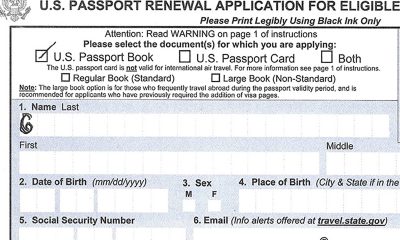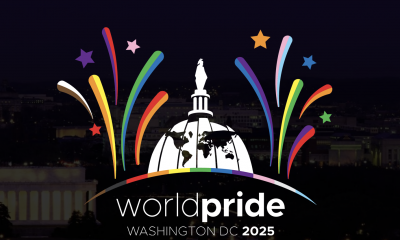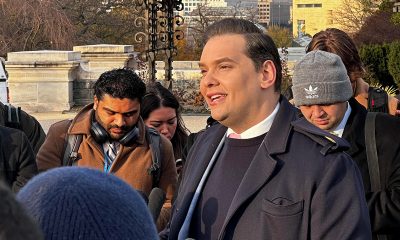News
Trump tweets ‘never forget’ on anniversary of Pulse shooting
President posts image of 49 killed in gay nightclub
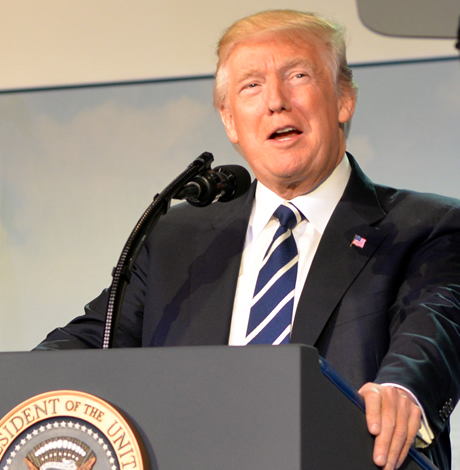
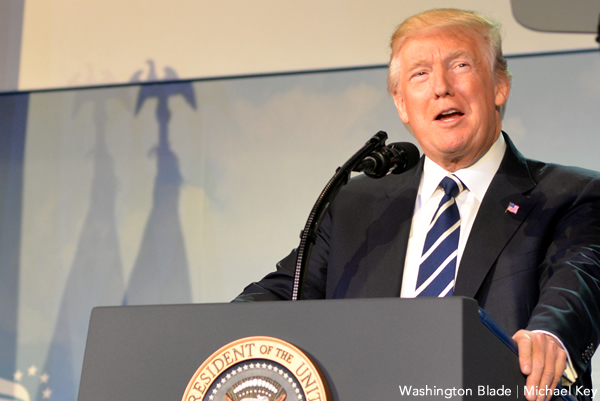
President Donald Trump tweeted “never forget” on the anniversary of the Pulse shooting. (Washington Blade file photo by Michael Key)
On the one-year anniversary of the Pulse massacre, President Trump tweeted on Monday an image of the 49 individuals killed at the gay nightclub, urging his followers to “never forget” the victims.
“We will NEVER FORGET the victims who lost their lives one year ago today in the horrific #PulseNightClub shooting,” Trump tweeted.
Trump also used the hashtag #OrlandoUnitedDay, which is one of the hashtags used by those remembering the massacre in Orlando, Fla., as well as 49 people killed and 53 wounded on that day.
We will NEVER FORGET the victims who lost their lives one year ago today in the horrific #PulseNightClub shooting. #OrlandoUnitedDay pic.twitter.com/OFFUVAFBJM
— Donald J. Trump (@realDonaldTrump) June 12, 2017
Trump’s tweet is consistent with remarks he made over his presidential campaign invoking the mass shooting, the deadliest in American history, as evidence of the need to confront Islamic extremism. During his acceptance speech at the Republican National Convention, Trump recalled the shooting and said he’d “protect our LGBTQ citizens from the violence and oppression of the hateful, foreign ideology.”
But the tweet contrasts with anti-LGBT policy initiatives from Trump over the course of his administration, such as the revocation of Obama-era guidance assuring transgender kids access to school bathrooms consistent with their gender identity, as well as anti-LGBT appointments like U.S. Attorney General Jeff Sessions and Secretary of Housing & Urban Development Ben Carson.
As similar violence inspired by violent extremism takes place across the globe, Trump has promoted the idea of a travel ban temporarily banning refugees and immigration from six Muslim-majority countries. Courts have enjoined the enforcement of the ban on the basis that it violates due process and freedom of religion and litigation challenging the ban has reached the Supreme Court.
A White House official told the Washington Blade via email the tweet represents Trump’s opposition to violence and commitment to defeating terrorism.
“The president has been clear that he condemns all acts of violence against any American and what happened in Orlando should never happen again,” the official said. “He will always fight against all acts of terrorism against any American.”
In response to a Blade inquiry on the origin of the photo Trump tweeted, the White House official professed to be unaware, but was looking into that.
U.S. Federal Courts
Second federal lawsuit filed against White House passport policy
Two of seven plaintiffs live in Md.
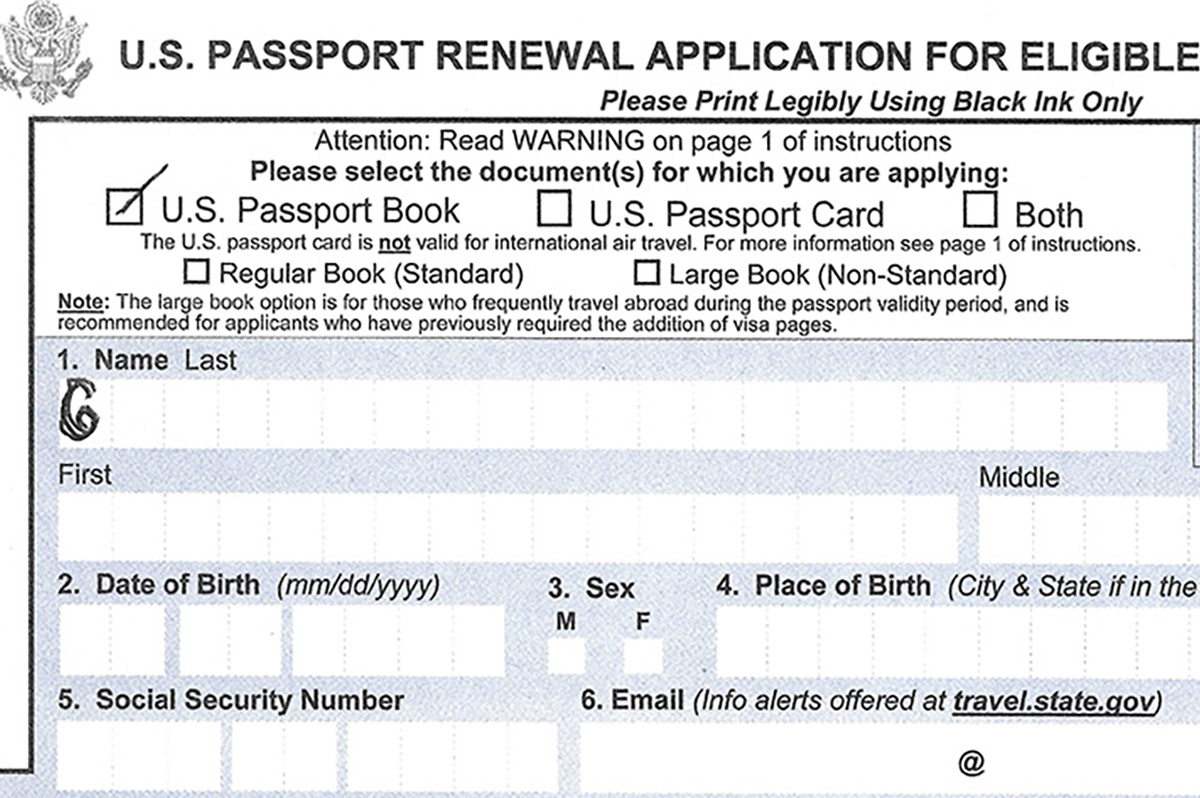
Lambda Legal on April 25 filed a federal lawsuit on behalf of seven transgender and nonbinary people who are challenging the Trump-Vance administration’s passport policy.
The lawsuit, which Lambda Legal filed in U.S. District Court for the District of Maryland in Baltimore, alleges the policy that bans the State Department from issuing passports with “X” gender markers “has caused and is causing grave and immediate harm to transgender people like plaintiffs, in violation of their constitutional rights to equal protection.”
Two of the seven plaintiffs — Jill Tran and Peter Poe — live in Maryland. The State Department, Secretary of State Marco Rubio, and the federal government are defendants.
“The discriminatory passport policy exposes transgender U.S. citizens to harassment, abuse, and discrimination, in some cases endangering them abroad or preventing them from traveling, by forcing them to use identification documents that share private information against their wishes,” said Lambda Legal in a press release.
Zander Schlacter, a New York-based textile artist and designer, is the lead plaintiff.
The lawsuit notes he legally changed his name and gender in New York.
Schlacter less than a week before President Donald Trump’s inauguration “sent an expedited application to update his legal name on his passport, using form DS-5504.”
Trump once he took office signed an executive order that banned the State Department from issuing passports with “X” gender markers. The lawsuit notes Schlacter received his new passport in February.
“The passport has his correct legal name, but now has an incorrect sex marker of ‘F’ or ‘female,'” notes the lawsuit. “Mr. Schlacter also received a letter from the State Department notifying him that ‘the date of birth, place of birth, name, or sex was corrected on your passport application,’ with ‘sex’ circled in red. The stated reason was ‘to correct your information to show your biological sex at birth.'”
“I, like many transgender people, experience fear of harassment or violence when moving through public spaces, especially where a photo ID is required,” said Schlacter in the press release that announced the lawsuit. “My safety is further at risk because of my inaccurate passport. I am unwilling to subject myself and my family to the threat of harassment and discrimination at the hands of border officials or anyone who views my passport.”
Former Secretary of State Antony Blinken in June 2021 announced the State Department would begin to issue gender-neutral passports and documents for American citizens who were born overseas.
Dana Zzyym, an intersex U.S. Navy veteran who identifies as nonbinary, in 2015 filed a federal lawsuit against the State Department after it denied their application for a passport with an “X” gender marker. Zzyym in October 2021 received the first gender-neutral American passport.
Lambda Legal represented Zzyym.
The State Department policy took effect on April 11, 2022.
Trump signed his executive order shortly after he took office in January. Germany, Denmark, Finland, and the Netherlands are among the countries that have issued travel advisories for trans and nonbinary people who plan to visit the U.S.
A federal judge in Boston earlier this month issued a preliminary injunction against the executive order. The American Civil Liberties Union filed the lawsuit on behalf of seven trans and nonbinary people.
District of Columbia
A room with Pride: D.C.’s LGBTQ history finds a new home at the Eaton
New suites highlight city’s queer community

Blocks away from where Frank Kameny once organized the first pickets for gay rights in Washington, a new hotel suite invites guests to relax, recharge, and revel in the LGBTQ history of the city with the capital’s first-ever Pride-themed room at the Eaton Hotel.
From the walls covered in Washington Blade archival photos from the past 50 years, to a vinyl library that spans decades and genres of music celebrated by LGBTQ fans, and little affirmations written on the mirrors, it becomes clear as soon as you open the door that this room is one of a kind.
The Blade sat down with Nina Ligon, the director of culture for the Eaton, in the suite to discuss why the boutique hotel has chosen to debut a Pride-themed room and how their unique mission-driven hospitality is at the center of it all.
Starting with how the relationship between the Blade and Eaton came to be, Ligon explained that the collaboration with D.C.’s principal LGBTQ newspaper has been around longer than she has been with the hotel.
“The Blade has always been present,” Ligon said. “It’s one of the entities here in the city that’s just always been around. When I came into my position here at Eaton, Sheldon Scott — our original director of culture who helped open the hotel — already had a relationship with Stephen [Rutgers] and other members of the Washington Blade. Through that we have been able to establish a really strong relationship in the city.”
That relationship flourished after the boutique hotel, which sees itself as more than a hotel — but a cultural hub for those wishing to explore Washington — was nominated for the Best of LGBTQ DC Awards, given out and published by the Blade.

“Beginning in 2022 we were first voted for best LGBTQ hotel in the city by the Best of LGBTQ DC Awards,” she said. “In 2023 we fell off, but that’s all right. We did get Editor’s Choice in 2024, and we’re gonna make a comeback.”
That comeback, Ligon hopes, is aided by the addition of the new Capital Pride-themed hotel suite, which used feedback from LGBTQ hotel staff to determine what went in the room.
“It’s community. We have a really great team here at Eaton, so we were able to put together a committee with anyone who wanted to be involved and have some say. And that’s not just the pride suite specifically, but World Pride in general — in our pride efforts, 365, right throughout the year. A lot of these,” she said, pointing to the walls covered in framed photos taken from the Blade archive, “are ideas that came up during those early meetings just a few months ago. There were discussions of inflatable chairs and disco balls, and I was for it. I’m here to support their creative vision. And you know, we have to involve the corporate folks, and they’re a little more traditional than some of us. But the team really came together with some of the pieces and the timeline wall art that we’re working on.”
Ligon continued, explaining that special attention was given to ensure diverse LGBTQ experiences are represented in the room. From the pictures of LGBTQ icons like Marsha P. Johnson and RuPaul, to the music on their sound system (including Chappell Roan’s “The Rise and Fall of a Midwest Princess” and Troye Sivan’s “Bloom”), and the quotes on the walls, their goal was to uplift the whole LGBTQ community rather than one particular identity.
“My colleague, Eduardo [Romero], who’s been just a beam of light in my life, brought this to my attention. As a Black woman, I was reading through the Blade’s archive links and was sifting through some of those and he was like, ‘Okay, yeah, these look good, but there’s some people who are missing.’ Capital Pride has been traditionally cis, white male led. He helped me, as a Black woman, to step back and say. ‘Say, oh, wait, there’s more that we can be representing here. There are more people we could be representing.’ And so I reached out to DC Black Pride to see what image imagery they may have had and what input they had. And we were able to come up with a little something.”
As the tour of the room came to a close, Ligon told the Blade what she hopes people get from staying in this suite.
“When it comes to Pride, Pride is resistance,” she said. “Pride is more than just a party. Pride is an opportunity. It started with people who were fighting for their rights and their mere existence. And so I really want people, whether they come here to party or to take a load off, I really want them to take some time to reflect and see Pride for what it is, and that first being a form of resistance as we chart the course forward into a brighter future for the LGBTQ community and for all. None of us are free until we are all free. And I hope that this will be a reflection of that.”
The Eaton Hotel is at 1201 K St., N.W.
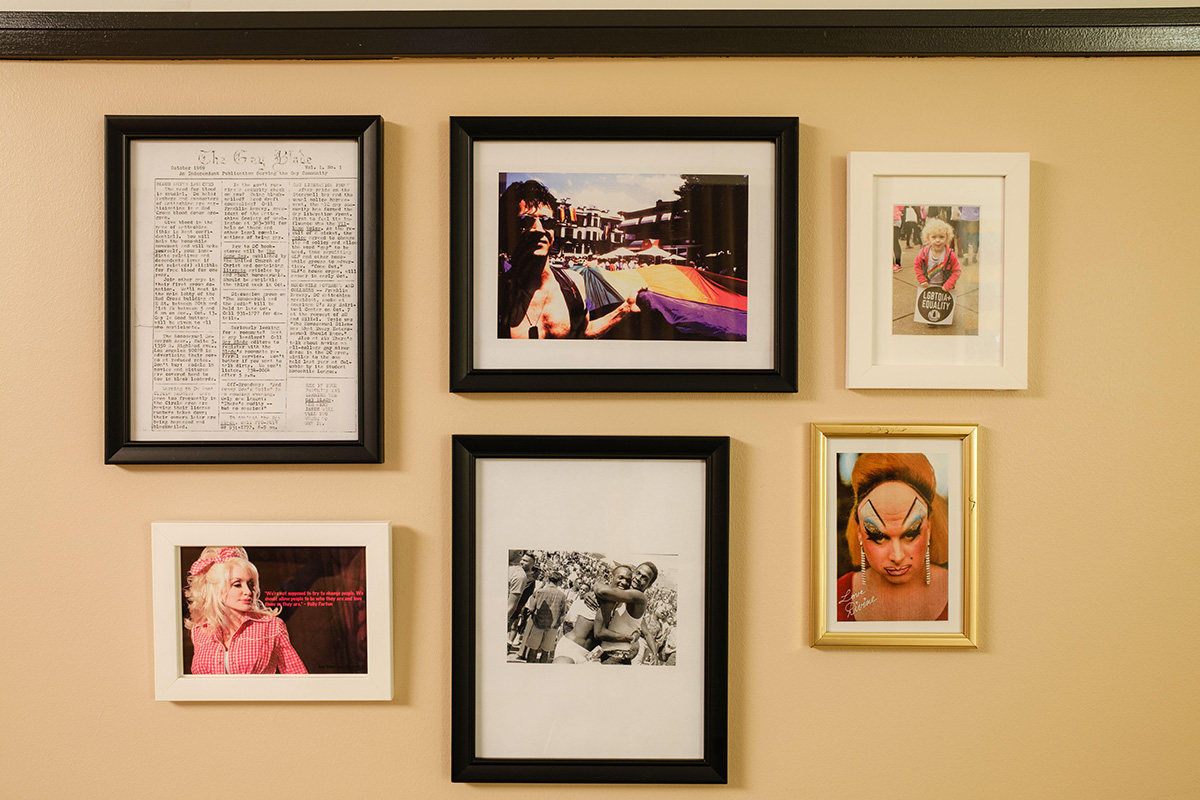
Opinions
We must show up to WorldPride 2025 in D.C.
Boycotts offer symbolic protest, but absence creates silence
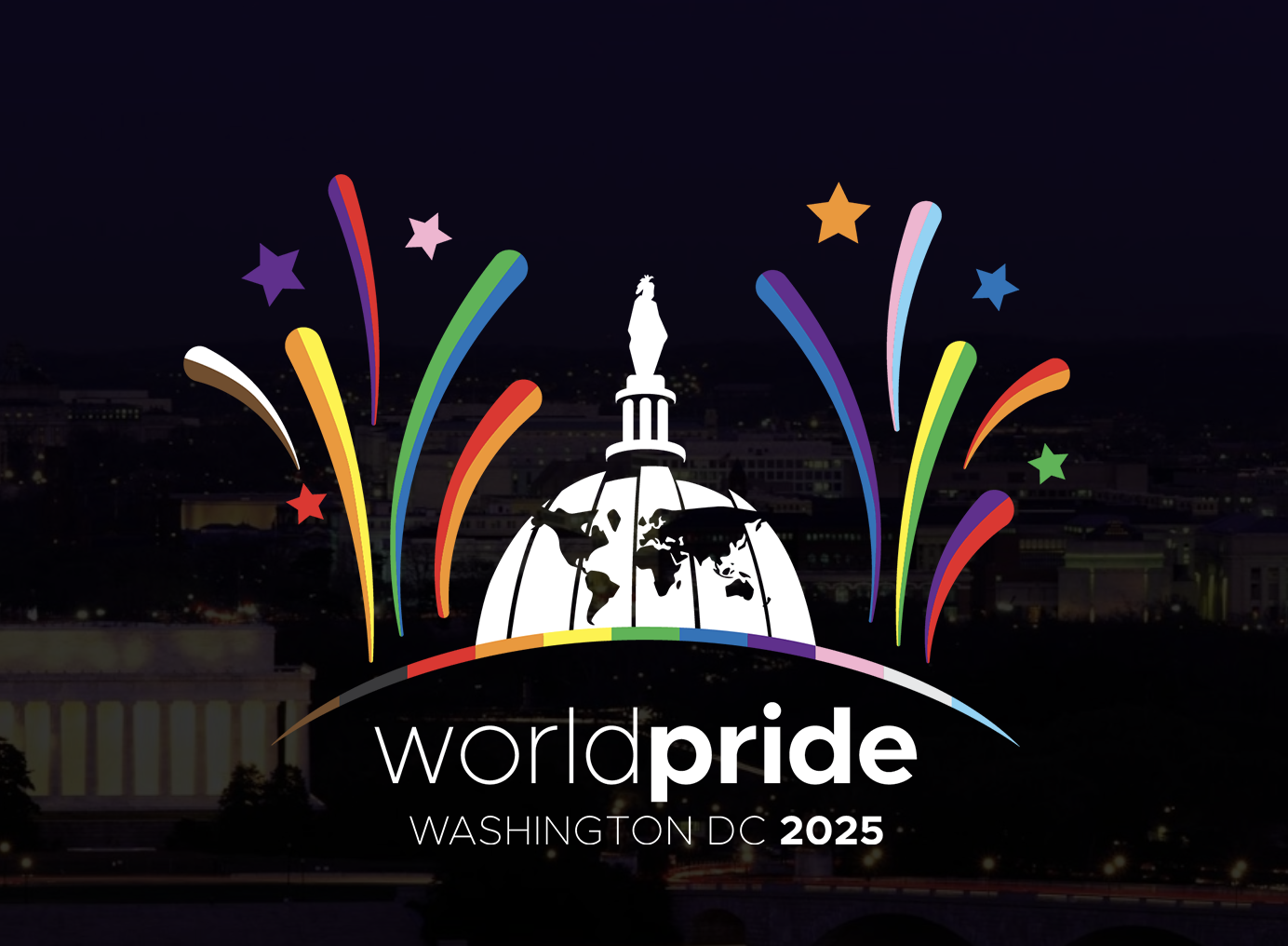
As an LGBTQI+ activist from Argentina, a country currently facing deep setbacks under an openly anti-rights government, I understand the frustration and fear many are expressing about attending WorldPride 2025 in the United States. I also understand the symbolic weight of showing up anyway.
Following the announcement by Egale Canada and the African Human Rights Coalition that they are withdrawing support for WorldPride due to the Trump administration’s anti-LGBTQI+ stance, concerns have rightly been raised about safety, complicity, and principle. These concerns must not be dismissed. But they must be responded to with a deeper strategic reflection: Visibility, presence, and collective action remain our greatest tools in confronting oppression.
Boycotts may offer symbolic protest, but absence creates silence
WorldPride is not organized by the U.S. government. It is a platform created by and for LGBTQI+ civil society — local activists, grassroots groups, trans-led collectives, BIPOC-led organizations, and everyday people building community despite hostile political environments. Boycotting this space sends a message not only to the Trump administration, but to our own movement: That when things get hard, we retreat.
History teaches us otherwise.
In 1990, amid the AIDS crisis and government neglect, activists did not boycott — they stormed the National Institutes of Health and the FDA. In 2014, when Russia passed its “gay propaganda” law, global solidarity at the Sochi Olympics became a powerful moment of protest and resistance. And in 2020, amidst a pandemic and police violence, Pride went digital but never disappeared.
If we set the precedent that global LGBTQI+ events cannot happen under right-wing or anti-LGBTQI+ governments, we will effectively disqualify a growing list of countries from hosting. That includes not only the U.S. under Trump, but Hungary, Italy, Uganda, Poland — and even my own country, Argentina, under Javier Milei. Yet ILGA World still plans to convene its 2027 conference in Buenos Aires, and rightly so. We must not surrender global platforms to the very governments that wish to erase us.
WorldPride is not a reward for good governance. It’s a tool of resistance
To those who say attending WorldPride in D.C. normalizes Trump’s policies, I say: What greater statement than queer, trans, intersex, and nonbinary people from around the world gathering defiantly in his capital? What more powerful declaration than standing visible where he would rather we vanish?
Safety is paramount, and all governments — including the U.S. — must guarantee the protection of LGBTQI+ participants. But refusing to engage is not the answer. In fact, visibility in hostile spaces has always been a hallmark of our movement’s strength. We showed up at Stonewall. We marched on Washington in 1979. We protested during the AIDS crisis, and we will show up again now — not in spite of adversity, but because of it.
We are in a global moment of rollback. Division is what our opponents want
The rise of anti-gender ideology and trans-exclusionary narratives has created fertile ground for far-right movements worldwide. In this moment, LGBTQI+ solidarity must be global, intersectional, and uncompromising. We cannot afford to fracture our own movement based on geopolitical fault lines.
Egale Canada and the African Human Rights Coalition raised legitimate criticisms — of U.S. foreign policy, immigration barriers, and systemic racism. But those issues must be confronted within WorldPride, not from outside it. We must bring those critiques into plenaries, panels, and the streets of Washington. We must create space for diasporic, racialized, and grassroots-led voices. We must use this moment to hold institutions accountable and shift the power of Pride to those most affected.
Because that is what solidarity looks like — not abandonment, but engagement.
WorldPride 2025 must not be a party disconnected from reality. It must be a protest rooted in our global truths.
Let us not cede this space. Let us make it ours.
Mariano Ruiz is the president of Derechos Humanos y Diversidad Asociación Civil in Argentina. He is also a 2019 Columbia HRAP Alumni.
-

 District of Columbia5 days ago
District of Columbia5 days agoD.C. police seek help in identifying suspect in anti-gay threats case
-

 Virginia2 days ago
Virginia2 days agoYoungkin calls on gay Va. GOP LG candidate to exit race over alleged ‘porn’ scandal
-

 Opinions5 days ago
Opinions5 days agoOn Pope Francis, Opus Dei and ongoing religious intolerance
-

 Commentary4 days ago
Commentary4 days agoA conversation about queers and class

